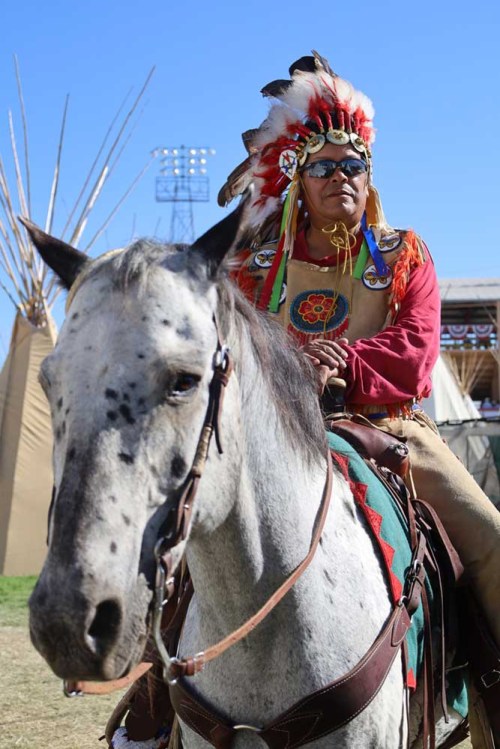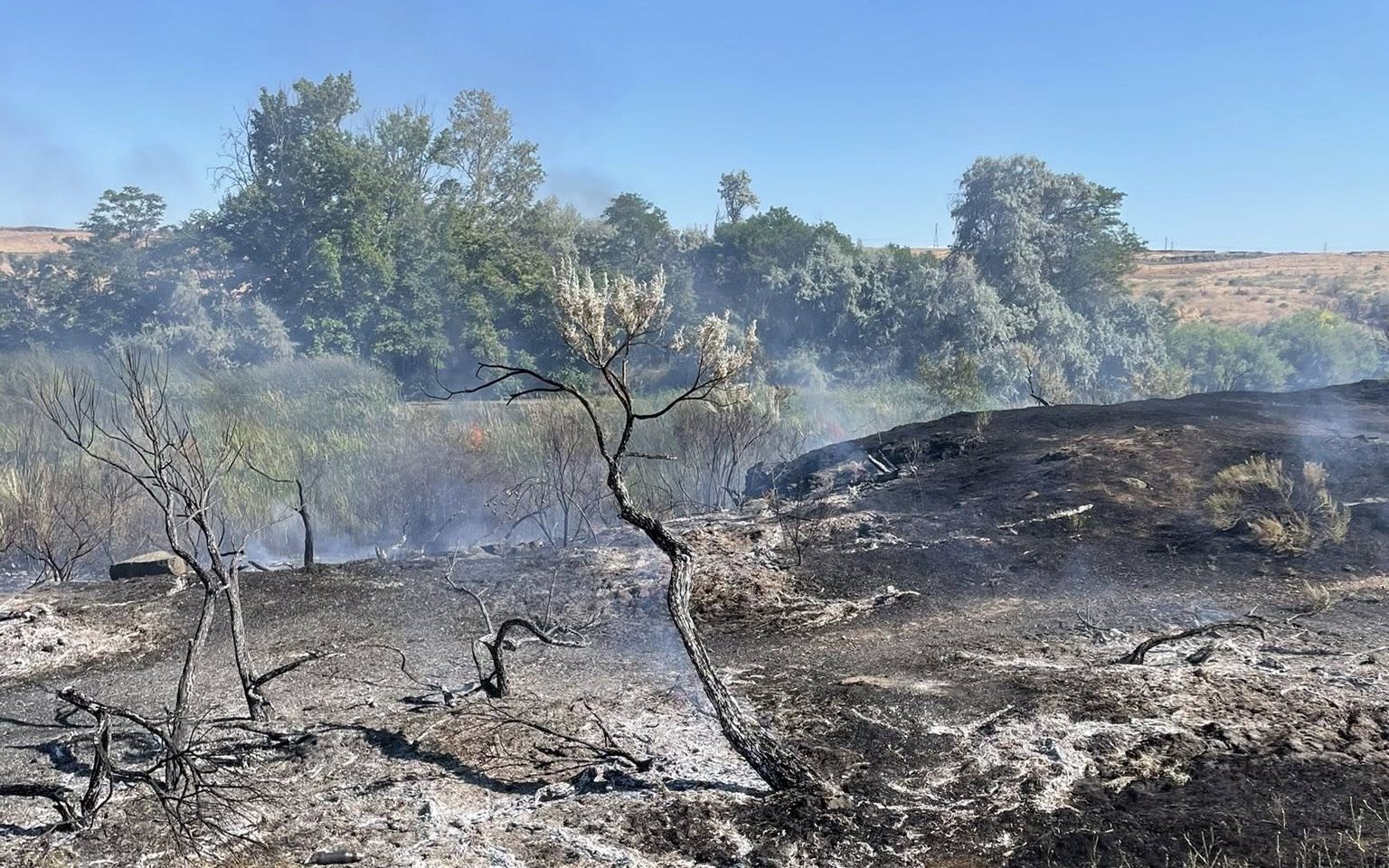Pendleton Round-Up
Published 5:00 am Friday, September 13, 2024

- Stuart Harris sits atop Thunder.
PENDLETON — Daylight breaks over the empty field. At 6 a.m. the gates open, and before long the Harris family is hauling their five teepees from a trailer, “looking pretty rez,” into what’s rapidly becoming the Indian Village. Among the abundance of white canvas, their camouflage teepees draw the eye.
“It’s the most stressful day of the year,” Stuart said. “When I get down there, I’m all amped up on coffee and ready to go to battle for my spot.”
Stuart’s family has been involved in Round-Up since 1910, and his mother was even born in the Indian Village. During the past century, their spot has shifted to the area handed down from Stuart’s uncle.
The teepees at camp were made from twill by Deborah, Stuart’s wife. For their wedding, Stuart’s mother had gifted them with a family teepee. Using its dimensions, Deborah later constructed three teepees to give away for Stuart’s Indian name ceremony, earning her a reputation in town as a teepee maker. Today, a number of teepees in the village were made by Deborah.
Stuart likens the event to “a big camping party,” albeit one with horses, war bonnets, and teepees with university flags waving at the top.
Beside the camo teepees is a striking Appaloosa horse with long spotted hair.
“That’s Thunder,” Deborah said. “He’s the one we traded one of the camo teepees for.”
Deborah and Stuart were visiting Thunder’s owner in Wallowa County the day he was born. Stuart is a descendant of the Wallowa band of the Nez Perce tribe, and Thunder’s lineage traces back to the Nez Perce horses, a link that makes him even more special to the family. This year, both Thunder and the camouflage teepees are 19 years old.
“He’s my buddy. I like him a lot,” Stuart said. “I wish I rode him more — I’ll never have another one like this. For me he’s the best looking horse of all the horses.”
Each day of the Round-Up, Stuart rides Thunder into the arena for what could be described as the Native American halftime show. Dressed in regalia, Stuart and Thunder walk through the freshly manicured dirt on the perimeter. In the middle of the arena, families dance on the grass to the beat of handheld drums. Some are vying to win best-dressed or best dancer. A few elders ride in golf carts.
“Horses are prey animals, and it’s loud and scary,” Stuart said.
Inexperienced riders and horses unaccustomed to the commotion create a prime opportunity for accidents.
“I’ve seen three, four, five horse crashes in there,” Stuart said. “People get thrown into the ground, people get broken arms and legs.”
The same goes for the Westward Ho! Parade on Friday morning. The parade celebrates the Old West and prohibits motorized vehicles. All participants are on stagecoaches, wagons, horses or on foot. With longhorn cattle and mules in the mix, events can be unpredictable.
As a child, Stuart remembers the crowd tossing coins at the Native Americans during the parade.
“As little kids it was really fun because you could pick them up and earn some pocket money,” Stuart said. “But when we were teenagers, we started noticing that people were throwing coins in the horse poop — and they were doing it on purpose.”
Stuart’s generation decided to change the situation, and today no coins are thrown during the parade.
Deborah recalled her first year at Round-Up, when she was 21. She and Stuart had met earlier that year as college students in La Grande. Coming from such a small community, Stuart remembered his grandmother’s advice: “Go find a good strong woman from another tribe, and bring her home, and then teach her our ways, and then raise the kids in our ways.”
As a member of the Karuk tribe growing up in Central Oregon and Wallowa County, Deborah had never been to Round-Up before she met Stuart. As a newcomer, Deborah was overwhelmed by the crowds and chaos.
“I had on this old, long necklace, and I remember I was so terrified it was going to break—that was mostly what I was concerned about,” Deborah said.
When Deborah and Stuart moved to the Umatilla Indian Reservation, Deborah was a stay-at-home mother. For her, Round-Up and Happy Canyon became a way to socialize and integrate into the community. All three of their daughters have been Happy Canyon princesses. Katie, the oldest daughter, also was chosen to be a Round-Up princess, making her one of the few to hold both positions.
Whether it’s about teepees or participating in Happy Canyon, the intergenerational transfer of knowledge is a highlight of Round-Up for Stuart.
“It’s a real thing that happens, where the old folks teach the young folks,” he said. “A lot of people come and go over the years, and then to watch all of our kids and grandkids grow up, I mean, when you say ‘Round-Up’ here in Pendleton, it means something special for the people who participate in it.”
Stuart is an avid hunter. Before winter, he heads into the wilderness for about two weeks to hunt elk, just “long enough to keep the skills alive,” according to Stuart. He’s mastered the skill to stay warm and dry in any kind of condition.
Because Stuart and Deborah have maintained these traditional skills, they are sometimes asked to verify the accuracy of scenes in Happy Canyon that involve acts like hide tanning or using a mortar and pestle.
And when families in Indian Village needed poles this year, the directors knew to ask the Harrises if they had extras.
“I did, because we live the life,” Stuart said. “We actually do have the teepees, we do have the poles, and we do use them. So I loaned a bunch of them.”
If there’s one drawback to the festivities, it’s being too busy to enjoy everything. Between fixing regalia or attending to a horse, Deborah ends up watching most of the rodeo on the big screen visible from her teepee. Although it’s exhausting, the fun is well worth it.
“It truly is a wonderful, one-of-a-kind, best outdoor rodeo there is, and Happy Canyon’s the best night show,” Deborah said. “I mean, livestock, running cavalry, running Indians — it’s pretty cool.”
Despite the rocky history between the settler and Native populations portrayed in the show, Stuart said the community today has healed and grown stronger together.
“We got friends on both sides, and I think it’s the best of both worlds myself,” Stuart said. “It’s such a mix-mash of cultures at Round-Up. That’s one of the reasons we like it so much because people do seem to get along, and traditionally you don’t think we would, but we do.”
This is part five of a six-part feature from Olivia Wolf, writer and editor ofthetinyvagabond.com.
She wrote the story about the 2023 Pendleton Round-Up and Happy Canyon Night Show. The work focuses on the perspectives of seven people:
• A grandmother and granddaughter from the Yakama tribe who stay in the Indian Village and whose family has been attending the Pendleton Round-Up since its founding in 1910.
• A husband and wife of the Confederated Tribes of the Umatilla Indian Reservation who also stay in village and live on the reservation near Pendleton.
• Pake Sorrey, Pendleton local who won the 2023 Round-Up steer roping competition and whose father won twice before him.
• And Toni Minthorn, a horsewoman and 2023 Hall of Fame inductee who trains the Round-Up queen and princesses to do the grand entry.
The East Oregonian is publishing a new part each day of the week during the Pendleton Round-Up.






